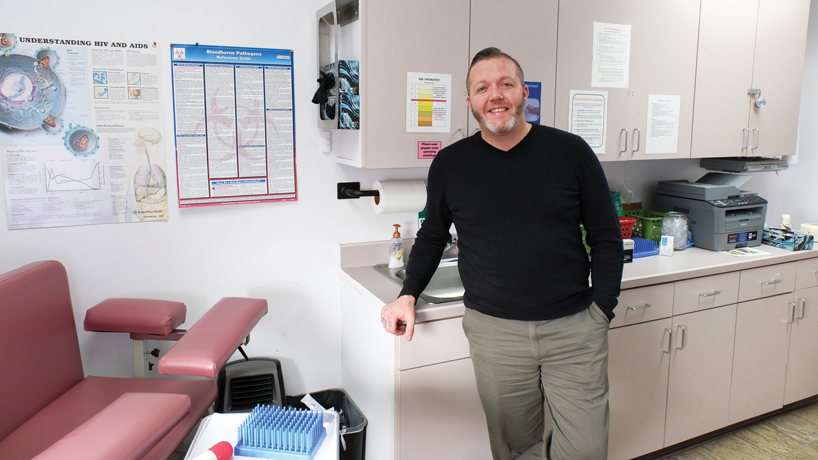
Gregory Faupel, MSW 2018, became the treatment coordinator and prevention specialist for Saint Louis Effort for AIDS in January. Faupel started volunteering for the agency in 2014 as a sign of gratitude for the support he had previously received as a patient. (Photo by August Jennewein)
University of Missouri–St. Louis Master of Social Work graduate Gregory Faupel personally knows the care and foundational support system needed by people who preliminarily test positive for HIV.
Six years prior to working as a treatment coordinator and prevention specialist at Saint Louis Effort for AIDS, Faupel awaited his own results.
Faupel awoke in April 2012 with a bilateral facial palsy. He couldn’t speak, smile or close his eyes for eight months. He taped his eyelids shut to attempt sleep.
An extremely rare condition, with an incidence of one in 5 million, the bilateral palsy pointed to an underlying cause. That’s when Faupel learned his HIV positive status.
He had a viral load of 350,000 and a white blood cell count of 192 – an AIDS diagnosis being any count below 200. His doctor prescribed antiretroviral therapy to suppress his HIV viral load to undetectable status, allowing him to live a healthy life.
Faupel grew up in Ferguson, Missouri. Throughout high school, an undergraduate degree in musical theater performance and even into his original career on stage, he struggled to reconcile childhood experiences of sexual abuse unknown to his family.
Faupel began using drugs intravenously to bury the past until he found himself broke on the streets of Nashville, Tennessee, in 2013. He messaged the single Facebook friend he had in town with three words: “I need help.”
Faupel’s “savior” got him home to his family, and he was immediately admitted into inpatient rehabilitation. Upon successful completion, he developed a plan while residing in a halfway house. He would build a record of reliability through volunteer work and apply to a social work degree program.
That’s how Faupel first started volunteering at the front desk of EFA in 2014 in a gesture of gratitude for the agency’s support. The following year, he gained acceptance into the MSW program at UMSL.
By fall 2015, Faupel began his coursework, including a grant-writing class that resulted in his team submitting a winning grant to the Episcopal Presbyterian Health Trust.
“I noticed that there was a need for an extra prevention specialist,” remembers Faupel, who volunteered at EFA on walk-in testing days Monday and Wednesday. “Clients were being turned away due to testing capacity.”
The grant funded a second prevention specialist, extended testing hours on Wednesdays and financed Faupel’s certification in phlebotomy, allowing EFA resources to double the number of people tested in a day from 11 to 22.
“I want to help as many people as possible,” Faupel says.
His dedication didn’t go unnoticed. Faupel became a volunteer manager for the prevention volunteer outreach team and stepped into his paid full-time position in January before graduating with his MSW from UMSL this spring.
“My objective is to grow EFA’s treatment coordination program through community collaboration,” he says, “and effectively build, bridge and link community stakeholders, assets and resources to strengthen our community.”
This story was originally published in the spring 2018 issue of UMSL Magazine. Have a story idea for UMSL Magazine? Email magazine@umsl.edu.














